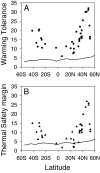Impacts of climate warming on terrestrial ectotherms across latitude
- PMID: 18458348
- PMCID: PMC2373333
- DOI: 10.1073/pnas.0709472105
Impacts of climate warming on terrestrial ectotherms across latitude
Abstract
The impact of anthropogenic climate change on terrestrial organisms is often predicted to increase with latitude, in parallel with the rate of warming. Yet the biological impact of rising temperatures also depends on the physiological sensitivity of organisms to temperature change. We integrate empirical fitness curves describing the thermal tolerance of terrestrial insects from around the world with the projected geographic distribution of climate change for the next century to estimate the direct impact of warming on insect fitness across latitude. The results show that warming in the tropics, although relatively small in magnitude, is likely to have the most deleterious consequences because tropical insects are relatively sensitive to temperature change and are currently living very close to their optimal temperature. In contrast, species at higher latitudes have broader thermal tolerance and are living in climates that are currently cooler than their physiological optima, so that warming may even enhance their fitness. Available thermal tolerance data for several vertebrate taxa exhibit similar patterns, suggesting that these results are general for terrestrial ectotherms. Our analyses imply that, in the absence of ameliorating factors such as migration and adaptation, the greatest extinction risks from global warming may be in the tropics, where biological diversity is also greatest.
Conflict of interest statement
The authors declare no conflict of interest.
Figures



References
-
- Sala OE, et al. Biodiversity: Global biodiversity scenarios for the year 2100. Science. 2000;287:1770–1774. - PubMed
-
- Thomas CD, et al. Extinction risk from climate change. Nature. 2004;427:145–148. - PubMed
-
- Parmesan C, Yohe G A. Globally coherent fingerprint of climate change impacts across natural systems. Nature. 2003;421:37–42. - PubMed
-
- Root TL, et al. Fingerprints of global warming on wild animals and plants. Nature. 2003;421:57–60. - PubMed
-
- Davis AJ, Jenkinson LS, Lawton JH, Shorrocks B, Wood S. Making mistakes when predicting shifts in species range in response to global warming. Nature. 1998;391:783–786. - PubMed
Publication types
MeSH terms
LinkOut - more resources
Full Text Sources
Other Literature Sources

